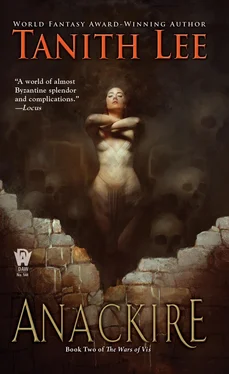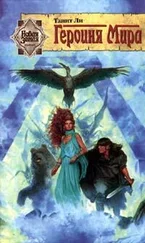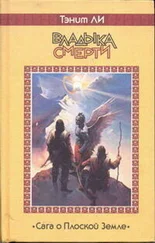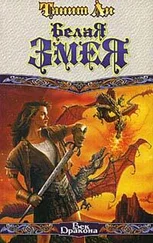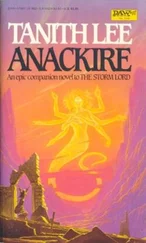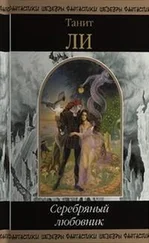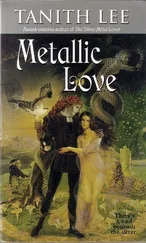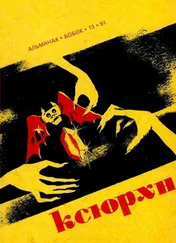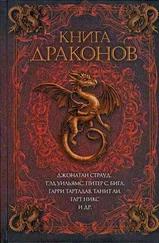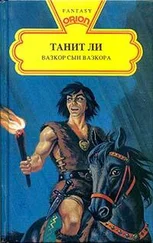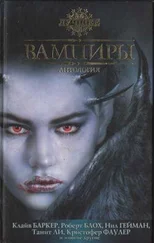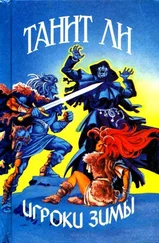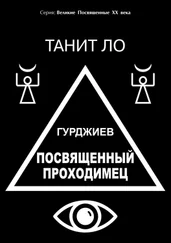He said nothing further, but a motion of his hand brought the pair of bulls to him, a man now at either side, the girls melted away.
Kesarh drew his knife. The edge was honed to a razor—he had been expecting this.
With a swiftness that was astonishing, and an atrocious accuracy, he swept his arm across the black taurian necks, slicing both throats before the stroke was ended.
Blood spouted, gushed. The great heads flopped, the bodies spasmed and sank, almost as one. Drowned in gore, the flowers unwove and streaked the steps with brackish red. But he had been so agile, there was not a splash on his fine clothes: even his hands were unmarked.
Long ago, in the past of the past, kings had sacrificed in such a way.
The priest, who had only gone for reinforcements, rushed out with his fellow officiates upon the terrace. Unneeded.
The King was stripped naked, save for the cloth about his loins. He had been at exercise with stave and bow, was en route to his bath, and that it was in this way and this state that he took the audience was significant. The insult was a blatant one. That the young man in the wine-red garments knew himself insulted, what rank he had totally ignored, must be certain.
“Well,” Suthamun said to him, letting the slave place a mantle at last across his shoulders. “Your explanation?”
Kesarh Am Xai looked at his King with enormous blankness.
“My explanation of what, my lord?”
“Your dance measure through my streets. Of that.”
“You gave us free entry, my lord. Your people chose to honor us, in your name.”
“ My name? You flounced back into Istris as if you’d re-taken Zakoris herself, instead of a brace of boats.”
“Seven ships, my lord.”
Suthamun, wrapped in the robe, sat down and drank wine. None was offered elsewhere. There were a number of others in the room, watching with interest. The oldest son, Prince Jornil, ate figs and stared at Kesarh’s clothing. As the father had coveted kalinxes nearly a month ago, the son now coveted this elegant costume. It irked Jornil that Kesarh, who had, and deserved to have, no revenues, could procure such tailors and such dyes.
“Seven ships,” said the King. “Or were you seeing more than double the number?”
There was a long pause. The offensive question apparently required an answer.
“Seven, my lord,” said Kesarh. “If you fear my reckoning is out, you might ask the captains you yourself appointed, Lios, or Raldnor Am Ioli.”
“I’ll ask them nothing. They’re disgraced. With you.”
Another long silence. Kesarh kept his eyes down, knowing what Suthamun might behold in them, should they be raised.
“You must excuse me, my King. I thought, when you sent me to Tjis, I went with your blessing to gain some renown for myself.”
“Did you? Then you should have waited for me to tell you so. You were sent, you Visian dog, to burn refuse on the sea. No more.”
There was a vague murmuring about the room. Suthamun ran his eye over it, daring it to grow louder, and it died.
The talk had reached the palace, the talk of the streets. Kesarh had been set on in the coastal town by agents of some enemy, some high enemy, who was envious. Only the skills of Ankabek had saved him.
That the King did not mention the sojourn at Ankabek was also evidential.
Kesarh waited. He waited for Suthamun to see that regal unfavor toward him now could reek of villainy. But Suthamun did not, or would not, see this.
“You came in,” said Suthamun Am Shansar, “like a young leopard. You can creep out again like a mouse. You will go at once to your estates at Xai.” Kesarh’s head came up and his eyes flashed like drawn knives. And Suthamun smiled. “Yes, my Salamander. The fire’s out.”
The ragged man bowed low, the third time he had done so.
“They’re selling locks of black male hair, saying it’s yours, sir. And the poet made a fine job of the paean; he’s singing it over in the eastern city by now. And the women—women we never funded—mooning over you, refusing their lovers—”
“All right,” the shadow said from the chair. And then, to another, and to the ragged man’s great relief, “Pay him what I told you.”
When the paid man had gone out, Kesarh rose and filled a glass goblet with water. This indeed was no hour for wine.
The mistake had been in not realizing fully he played this game against a dolt. Suthamun, too much an idiot to make the correct move, the move which would have laid brick on brick—
Kesarh drank the bitter water.
“What else?”
His guard sergeant handed him a package. It had been opened, tested for its motive.
Kesarh examined the contents.
“Raldnor Am Ioli’s third best ring. A love-token?”
The sergeant showed his teeth.
“Better than writing it, my lord.”
“True. He doesn’t like Suthamun’s response. Rather than blame me, he blames the King. Another fool. This one more convenient, perhaps, if he keeps his promises. Are those men ready to ride?”
“Yes, my lord. One fifth, as you ordered. The lads we’ve had longest, and most often seem about you.”
“They won’t like Xai. But then, neither shall I. There’s another man. One of the Nines, Rem. A Karmian with light eyes and friends in the Ommos quarter.”
“I know him. We put Biter to him not long ago.”
“Find him and send him there. The King gave me just until sunset to get out of Istris.”
There was a sound beyond the apartment door, the man on guard there striking the floor with his spear. Next second the door was flung wide.
A servant stood fluting in Shansarian: “Through the will of Ashara, the First Heir, Prince Jornil of Istris,” while Jornil brushed by him and walked into the chamber.
Kesarh looked at him. Jornil beautifully returned the look. The light of late afternoon tumbled against him like a loving woman. The door was shut at his back.
“An honor,” Kesarh said shortly. “You’re here to wave me off.”
“I’m here to tell you to leave those clothes behind you when you go.”
Kesarh stared at him, then all at once he laughed, only one harsh note of it.
He pulled another flagon over and gestured to the sergeant. As the door closed a third time, Kesarh presented Prince Jornil with a drink of wine.
Jornil put the smoky glass down untasted.
“Come now,” said Kesarh. “Did you think I put something in it?”
Jornil beamed. They spoke in the Vis tongue. Despite the announcing servant, Jornil had some difficulty with the language of his fathers.
“No. But I don’t like your wine.”
“Karmian grapes.”
“Quite. The clothes. . . .”
“Of course, my Prince,” said Kesarh. He put his hand to the fastening of the tunic. “Now?”
“Oh, you can simply discard them here. I’ll send someone for them.”
“And do have them well-laundered. I rode at least three miles in them.”
Jornil picked up the wine, regarded it, put it down again.
“Is it true what they’re saying? I mean, that my father attempted to have you killed?”
Kesarh considered.
“It isn’t true. But I wonder why you should think someone is saying it.”
“It’s common gossip on the street. A poisonous snake at Tjis—”
Kesarh now burst out laughing. Jornil, not intending to, laughed with him.
“A minor wound in battle. No snake. Nor is there any reason on the earth,” said Kesarh, “for Suthamun to have need to kill me. He can send me to Xai, a living death. Much worse.”
Jornil, who did not like Kesarh, but who was yet vastly drawn to him, and who had been intermittently yet fascinatedly jealous of him since their childhood, snorted with amusement.
“I may come and visit you there.”
Читать дальше
